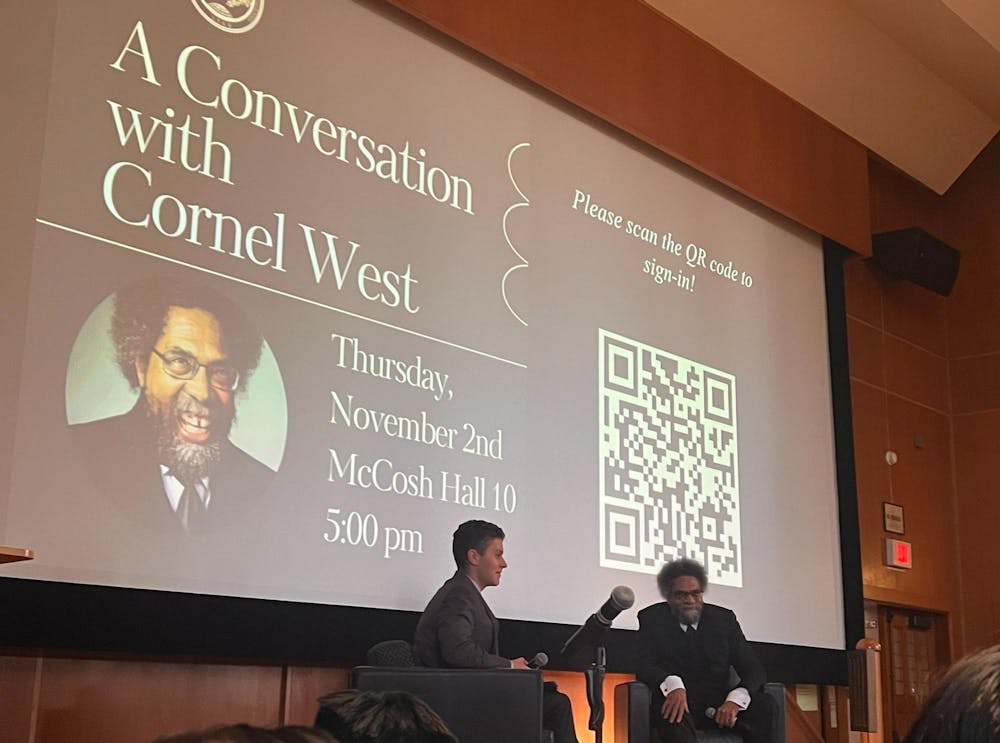The Whig Caucus, the left-leaning side of the the Whig-Clio debate society, initially advertised a “Presidential Town Hall with Cornel West.” It was one of an impressive line-up of speakers by the Whig-Clio society this semester including Gen. Mark Milley ’80 and Chinese dissident Chen Guangcheng. These high-profile speaker events are part of an effort to bring in more speakers that “challenge the current dialogue and status quo,” according to Whig Deputy Chair Emily Hove ’26.
The event was renamed to a “Conversation with Cornel West” after the University raised concerns, said Hove. Whig-Clio officials confirmed that the University expressed that if the event was a presidential town hall, more candidates should have been invited. As a result, the event, mediated by the Whig Chair Samuel Kligman ’26, avoided the topic of West’s presidential run altogether.
Professor emeritus and progressive activist Cornel West GS ’80 initially entered the presidential race as a People’s Party candidate, then switched to a Green Party candidate before ultimately deciding to run as an independent on Oct. 5. Most of his work centers around political philosophy in America, including his book “Race Matters.”
The University did not respond to a request for comment in time for publication.
“Dr. West is here in his position as an academic. He is not here on behalf of any presidential campaign or any presidential candidacy,” said Kligman, following a question asked by Young Democratic Socialists of America Co-Chair Abraham Jacobs ’26 on how West’s campaign could destigmatize socialism.
Instead, a key point of discussion was on West’s repeated calls for the U.S. to cease their involvement in the war in Ukraine and clashes with Harvard’s former president over his pro-Palestine politics. On Thursday, West explained that he believed ceasefires were necessary immediately in both conflicts, but a diplomatic process must follow to ensure that lasting peace is possible.
“Ceasefires are ways in which you stop the present suffering and then recount by means of diplomatic process, those who have been treated unjustly and viciously, have voice in that process so that their peace can be connected to justice,” West said.
West called for attention to be extended beyond Europe and the Middle East. “If there were cameras in parts of Africa and Asia and Latin America and a whole host of other places that were zeroing in on barbarity, we would see that over and over and over again,” West stated.
Kligman then brought West’s domestic politics to the forefront of the discussion, asking about West’s past statements characterizing America as a “racist, patriarchal” institution. West emphasized that America is a complex and diverse country: “[America] is variety, it is diversity, not just in terms of skin pigmentation, but in a whole host of other ways.”
West recounted how during his own time at Princeton 50 years ago, he was “one of the few chocolate folks among the white crowd” when he started as a graduate student in 1973.
“I got that thug in me, just like Tupac,” West said, as he explained how his family and his time at Princeton influenced his intellectual and moral values through virtues of courage and resilience.
Whig specifically urged students to break the mold.

“We don’t have enough courageous voices to speak for themselves and cut against all kinds of grains and lines and labels. Why? Because we want to be successful,” West stated.
When asked whether students should focus on making change now or focus on academics to make change through future careers, West said, “Both. Raise your voice. Then go back to Firestone and go do your work.”
Makenzie Hymes ’26 said that hearing West speak during what she describes as a “troubling time globally” was like a “breath of fresh air.”
“Dr. West’s messages invoking African American cultural and historical moments struck a chord and validated many of my interests, which are sometimes glazed over in the other academic setting,” Hymes said.
In a message to the ‘Prince,’ Kligman said this event was Whig-Clio’s largest turnout for a speaker event since 2018.
Justus Wilhoit is an assistant News editor, a contributor to The Prospect, and an assistant Audience editor for the ‘Prince.’
Sofia Arora is a News contributor for the ‘Prince.’
Please send corrections to corrections[at]dailyprincetonian.com








